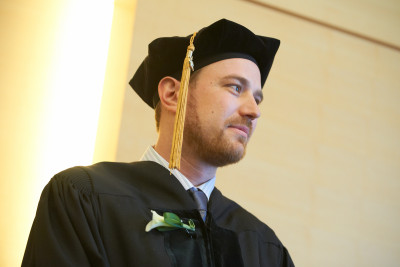
Second Annual Commencement
The Louis V. Gerstner, Jr. Graduate School of Biomedical Sciences
Memorial Sloan Kettering Cancer Center
May 10, 2013
Remarks of 2013 Graduate Nicholas Paul Gauthier
It’s an honor to be here representing the second-ever Gerstner graduating class of students. The people sitting in front of me are some of the most talented and intelligent people I have ever met. It still baffles me how we all made it here despite our weekly meetings at the Student and Faculty Club!
It really feels like yesterday that I arrived — bright eyed and bushy tailed — and arrogant enough to think that I would solve a disease that has puzzled science for centuries. One of my first memories of Sloan Kettering was during the orientation event when we were welcomed to the [Sloan Kettering] Institute and I ended up in a captivating discussion with Harold Varmus, the previous President of Memorial Sloan Kettering. We discussed science lightly, but the topic of conversation was really bicycling.
Those who know Harold would attest to the fact that he’s an avid outdoorsman and loves to bicycle. The following day he actually tracked me down and brought me a pamphlet about cycling in the city. It really struck me how this world-class scientist took the time to get to know me and my interests.
Really, this is just one example of the many ways that the faculty here have taken an interest in us and is a testament to the supportive atmosphere at the Sloan Kettering Institute.
Preparing for this speech, I looked into the background of my fellow graduates and was struck by the enormous amount of diversity among us, both in terms of each person’s personal educational background and also in how each approached the problem of cancer during his or her graduate work. Every single one of the Gerstner Sloan Kettering graduates today came from a different Sloan Kettering research department — from structural to developmental to computational biology. And this wide range of expertise was not only a tremendous resource but also provided a very special intellectual atmosphere.
Each of these specialties was combined with Gerstner Sloan Kettering’s strong emphasis on clinical translation and how to move basic research discoveries across the street to the doctors and patients [at Memorial Hospital]. Integration with the clinic not only provided us with a very personally motivating view of cancer but also gave us a unique perspective on the very different challenges faced by clinicians.
Unfortunately we’ve been largely unsuccessful at outsmarting the set of diseases we call cancer. I’m optimistic though. A range of technologies, including comprehensive characterization of individual patient tumors, and the ever-increasing number of highly specific therapies provide a foundation for a novel and rational way to tackle cancer.
The knowledge base we acquired at Gerstner Sloan Kettering, which was founded in basic science and combined with a unique clinical experience, gives us a strong lead in translating this massive accumulation of biological data into clinically relevant therapies.
So I truly believe that we’re in a unique position. Let’s take advantage of this amazing education we’ve acquired here at Gerstner Sloan Kettering. Let’s take the reins and lead this fight against cancer.
Congratulations to my fellow graduates. Thank you!